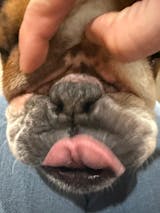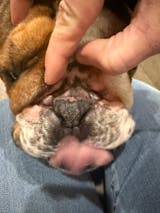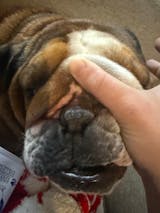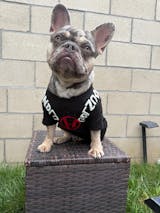What Are Common Skin Infections in Dogs?
As a proud owner of a wrinkly-faced pup, you likely know that their skin folds are prime locations for bacteria to thrive. Common skin infections—and other conditions like allergies, mites, and viruses—can cause significant discomfort in your furry friend. To keep your English Bulldog, French Bulldog, or Pug healthy and happy, it’s important to be aware of the signs of these common skin ailments and how to treat them. In this blog post, we will explore the most common skin infections in dogs and things you should do if your pup is showing signs of infection.

Yeast Infections:
Yeast infections are caused by an overgrowth of the yeast Malassezia pachydermatis that is naturally present on a dog’s skin. A variety of factors can cause this fungus to multiply, such as allergies, poor nutrition, and living in a humid environment. Symptoms of a yeast infection include redness, itching, odor, hair loss, and scabs or sores. Treatment for yeast infections may involve medicated shampoo washes and antifungal drugs. To help manage and prevent recurring infections, especially in skin folds, consider using Squishface Wrinkle Wipes for daily cleaning and Wrinkle Paste to create a protective barrier that keeps moisture and yeast at bay.
Bacterial Skin Infections:
Bacterial skin infections are caused by various types of bacteria that invade the skin through cuts or other breaks. These infections can be painful and irritating for your pup; symptoms include inflammation, redness, swelling, hair loss and/or scabbing. Treatment for bacterial skin infections typically involves antibiotics given orally or topically.
Demodectic Mange:
Demodectic mange is caused by mites that are present on a dog’s skin. These mites burrow under the skin and cause irritation, hair loss, and scabs. Demodex can either be localized or generalized; localized demodex appears in isolated areas of the body while generalized demodex covers the entire body. Treatment for this condition typically involves medicated shampoos, topical treatments, and oral medications. For dogs prone to irritation in skin folds, gentle cleaning with the help of Squishface Wrinkle Wipes and the protective application of Squishface Wrinkle Paste can help support skin health alongside prescribed treatments.
Tail Pocket Infections:
Cocker Spaniels, Bulldogs and other breeds with long and droopy ears are particularly prone to tail pocket infections. Tail pockets occur when moisture and bacteria become trapped in the fur around the base of a dog's tail; this can lead to infection and inflammation. Symptoms of a tail pocket infection include redness, itching, odor, hair loss and scabbing. Treatment may involve medicated shampoos or topical ointments that reduce irritation. Your vet may also recommend cleaning the area with the help of dog-safe products such as Squishface Wrinkle Wipes regularly to help prevent further infection.
Lip Fold Dermatitis:
No surprise here—wrinkly faced pups are prone to lip fold dermatitis due to the deep folds of skin around their mouths. This type of infection is caused by bacteria and yeast that can become trapped in these skin creases; it is typically accompanied by redness, inflammation, itchiness and odor. Treatment for lip fold dermatitis may involve medicated ointments or shampoos as well as regular cleaning of the area. Maintaining clean skin folds with the help of Squishface Wrinkle Wipes can help prevent secondary infections since they gently remove dirt, trapped moisture, and debris while targeting bacteria, yeast, and fungus with effective, dog-safe ingredients.
Infection Prevention & Care:
It's no secret that good prevention is better than a cure; and this applies to the health needs of your pup as well. Cleaning their wrinkles regularly may seem simple enough, but it can be challenging to fit into your daily schedule. The frequency of cleanings will depend on each individual dog’s needs, so pay attention for any signs or smells that indicate it’s time for another cleaning session!
Because your dog’s wrinkles can become infected so easily, it’s important to use preventative creams to make sure the area stays irritant-free. Squishface Wrinkle Paste is a thick cream designed to stay between the folds of your dog’s skin. Adding a water-resistant barrier, Wrinkle Paste helps repel fungus, bacterial, and excessive moisture between cleanings. It also helps soothe any hint of infection there. It’s fragrance free, easy to use, and completely safe for your pup! Using a Wrinkle Wipe, you want to thoroughly clean the area before applying Wrinkle Paste for best results.

Click here to read more on skin infections in dogs: spotting the signs, and helpful solutions.
The Bottom Line:
Common skin infections—including yeast infections, bacterial infections and demodectic mange—can cause significant discomfort in our furry friends. To protect them from health issues related to their floppy ears or other wrinkles, it’s important to be aware of the signs of these common skin ailments and how to treat them. If your English Bulldog, French Bulldog, or Pug is showing any signs of a skin infection, contact your vet right away for advice and treatment options.










